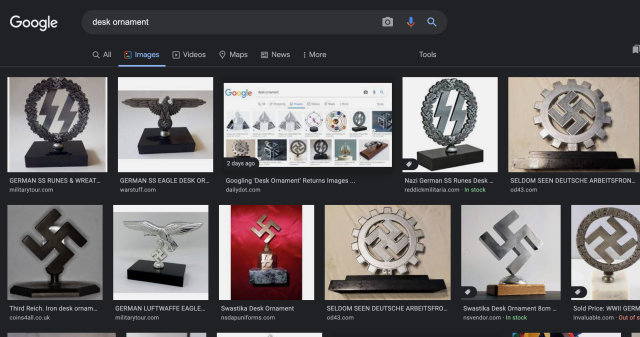It is widely known that antisemitism and anti-Zionism dominate social media networks, sadly from groups claiming to be Jewish themselves. However, few thought that the gatekeepers of the web, Google would allow such things the way the progressive-leaning social media companies do.
Then came a simple search by someone looking to decorate their desk, and it was then widely seen that either Google or its infamous algorithm really loves Nazi memorabilia.
Users across the web were left shocked by images with disturbing Nazi symbols, which appear in a simple Google search.
The issue was brought to light by a writer and frequent Twitter user Jason Pargin on Friday when he revealed that a Google search for images with the seemingly innocent term "desk ornament" leads to this disturbing content. Google users looking for this specific phrase are presented with a series of images not of ordinary table decorations, but for some reason of Nazi souvenirs.
Question: Go to Google Image Search and look for "desk ornament." Do you get a bunch of Nazi stuff as the top results?
— Jason Pargin, author of John Dies at the End, etc (@JohnDiesattheEn) July 1, 2022
Pargin tweeted: "Question: Go to Google image search and search for 'table decoration'. Do you get a lot of Nazi stuff as the top results? ”.
Many Twitter users responded to the tweet and wrote that they were experiencing the same results and noticing a lot of Nazi souvenirs, after simply searching Google for “table decoration”.
Despite the trendiness of the issue, this specific Google ‘glitch’ seems to have been reported back in 2016, when Twitter users posted how a search for “table decorations” brought up the same disgusting images of Nazi souvenirs.
The most likely hypothesis seems to be a lack of filtering in search engine results or a complex bypass of the algorithm to elevate these images to the top of the rankings.
These should categorically not be displayed on the German Google search results because it's completely illegal to display or promote Nazi imagery, memorabilia, propaganda etc (and this is a law that's strictly imposed 24/7/365) So it is all very very deliberate and suspicious... https://t.co/17rfrnhQ33
— Caro Berry (@zombie_xvx) July 1, 2022
Some web surfers have called on users to notify Google of the problem, as the enormous company has the ability to remove images. Google provides the option to fill out forms with an application to remove an image from search results and to report allegedly illegal content.
Users can simply fill out the forms and request the removal of the images because the company regularly updates its search results for images and tries to remove offensive or hateful content. The search engine states in the Terms and Conditions that offensive or hateful content is restricted or prohibited (depending on the circumstances).
Four different search engines - similar results. Why? How? pic.twitter.com/kq5qhQNldO
— Vic 🏳️🌈 (@Vic_R_) July 1, 2022
Danny Sullivan, who is in charge of public relations at the world’s largest search engine, responded to Pergin's tweet: "Sorry about that," Sullivan wrote. "Agree, this is not what most people would expect and also do not want in a search, unfortunately, there are many of these things that are described using these terms. We will try to evaluate how to improve."


